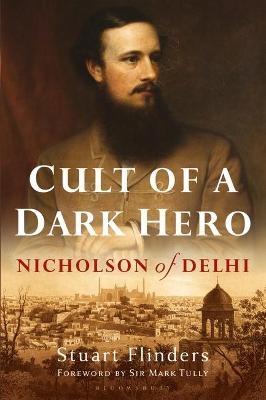
Cult of a Dark Hero
Bloomsbury Academic (Verlag)
978-1-350-14352-4 (ISBN)
- Titel ist leider vergriffen;
keine Neuauflage - Artikel merken
Previously unpublished material, including the diaries of contemporaries and personal letters, helps build a new perspective on Nicholson's personality. The book considers his sexuality and ambivalent attitude towards religion. It traces his murderous thoughts towards the Chief Commissioner of the Punjab, John Lawrence, and reveals that, remarkably, the Nikal Seyni cult continued into the 21st century. This is the first book-length biography of Nicholson for over 70 years. A new account of the Irish soldier who became an Indian God, an examination of the cult of a dark hero, is long overdue.
Stuart Flinders has been a journalist and broadcaster for 35 years. He has appeared as a correspondent on many BBC programmes and has been a presenter on BBC News and Radio 4's You and Yours. He is now a reporter based at MediaCity in Salford and regular presenter of live concerts on Radio 3. He is the holder of a Royal Television Society Broadcaster of the Year award. He studied Modern History at the University of Oxford.
Introduction: 'Hero of Delhi' or 'Great imperial psychopath'? Nicholson’s changing reputation considered.
1: 'Trying to hit the Devil', Ireland and India, 1822-1840…early life and first experience of India.
2: 'A bloodthirsty and treacherous Race', Afghanistan 1840-1842…Nicholson taken prisoner in Afghanistan.
3: 'I dislike India and its inhabitants', India and Kashmir, 1843-1846…homesickness and the First Sikh War.
4: 'A fearless, self-reliant, fierce and masterful man', the Sikh Rebellion, 1848…Nicholson’s energetic response to the breakdown of the alliance between Britain and the Sikhs.
5: 'A skirmish in the hills', The Second Sikh War, 1848-49… Nicholson’s growing reputation.
6: 'What corner of the Punjab is not witness to your gallantry?', Going Home, 1849-1851…origins of Nikal Seyni cult and Nicholson’s adventures as he returns home.
7: ' There is not one in the hills who does not shiver in his pyjamas when he hears his name mentioned', Bannu, 1852…Nicholson returns to India to become the strongman of Bannu.
8: 'The evil spirit within me', Bannu, 1853-56…Nicholson’s ambivalence on religion and his growing hatred of John Lawrence.
9: 'A good Mahomedan of the kind told of in old books', Kashmir and Peshawar, 1856-57…Nicholson as moral policeman in Kashmir.
10: 'The word is said and death surely follows', Peshawar, 1857…Nicholson responds to the outbreak of the Indian Uprising.
11: 'I have been hanging your cooks', the Movable Column, 1857…Nicholson chases down the Sepoy rebels.
12: 'Not a bad sliver, that!', Chasing the Sialkote Mutineers, July 1857…the Battle of Trimmu Ghat.
13: 'When an Empire is at stake, women and children cease to be of any consideration whatever,' Delhi, August 1857…Nicholson arrives at Delhi Ridge.
14: 'I wish I had the power of knighting you on the spot', Najafgarh and the Siege of Delhi, 1857…preparing for the assault on Delhi.
15: 'Woe to the bloody city!', The Assault on Delhi, 1857…Nicholson fatally shot during the assault on Delhi.
16: 'Is Nicholson any better?', Death, 1857…Nicholson’s decline and death.
17: 'His loss is a national misfortune', Aftershock, 1857…responses to the death of Nicholson.
18: 'The mother of heroes', Nicholson's legacy protected, 1857-1897…Nicholson’s family and friends try to manage his reputation after death.
19: 'I'm a little baffled about why they are valourising Nicholson now', Nicholson's Afterlife, 1857-2015…Nicholson’s loss of hero-status.
| Erscheinungsdatum | 27.06.2019 |
|---|---|
| Zusatzinfo | 2 Maps |
| Verlagsort | London |
| Sprache | englisch |
| Maße | 156 x 234 mm |
| Gewicht | 586 g |
| Themenwelt | Literatur ► Biografien / Erfahrungsberichte |
| Sachbuch/Ratgeber ► Geschichte / Politik | |
| Geschichte ► Allgemeine Geschichte ► Neuzeit (bis 1918) | |
| Geisteswissenschaften ► Geschichte ► Regional- / Ländergeschichte | |
| Geschichte ► Teilgebiete der Geschichte ► Wirtschaftsgeschichte | |
| Sozialwissenschaften ► Politik / Verwaltung ► Staat / Verwaltung | |
| ISBN-10 | 1-350-14352-9 / 1350143529 |
| ISBN-13 | 978-1-350-14352-4 / 9781350143524 |
| Zustand | Neuware |
| Informationen gemäß Produktsicherheitsverordnung (GPSR) | |
| Haben Sie eine Frage zum Produkt? |
aus dem Bereich


